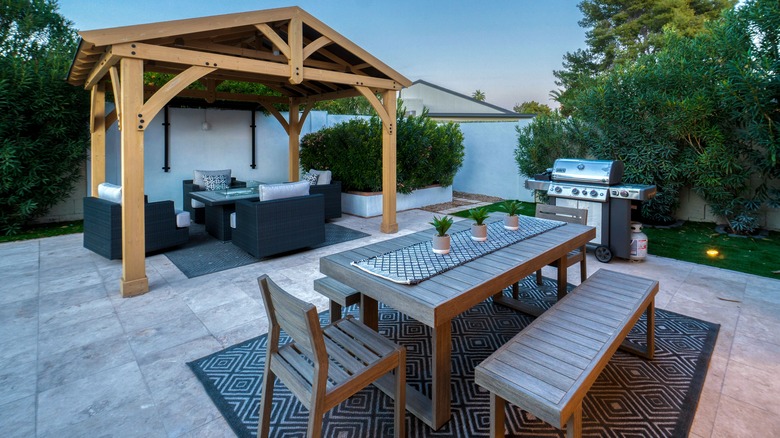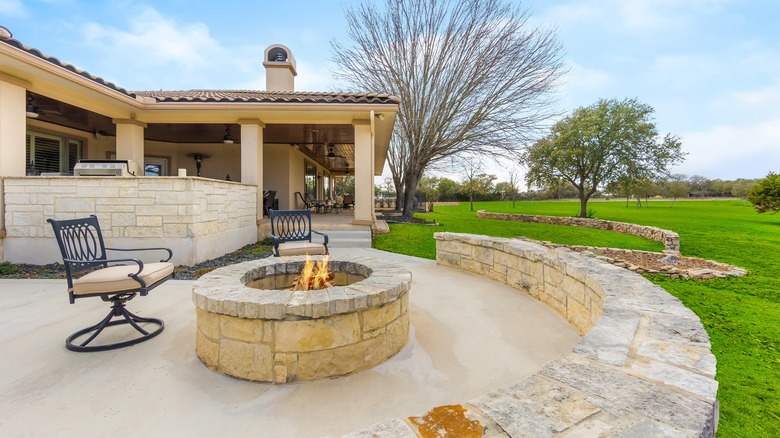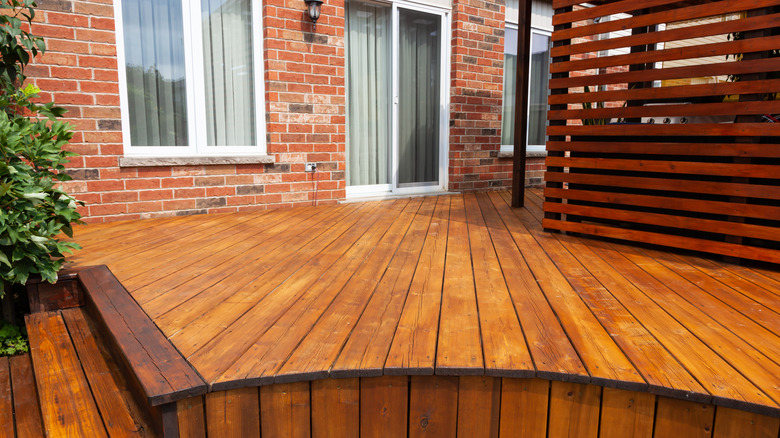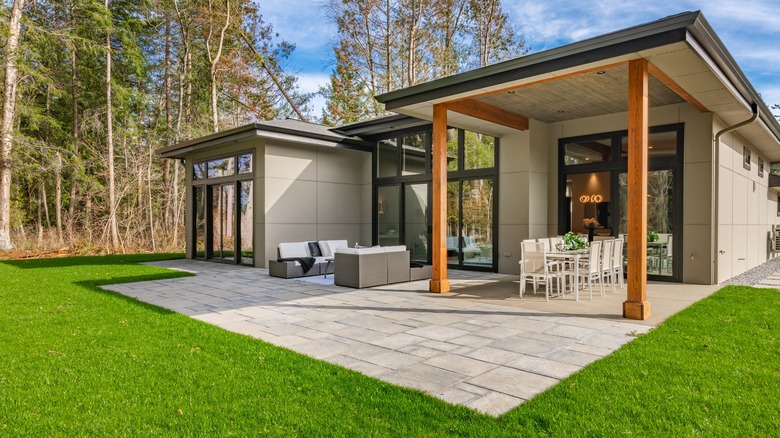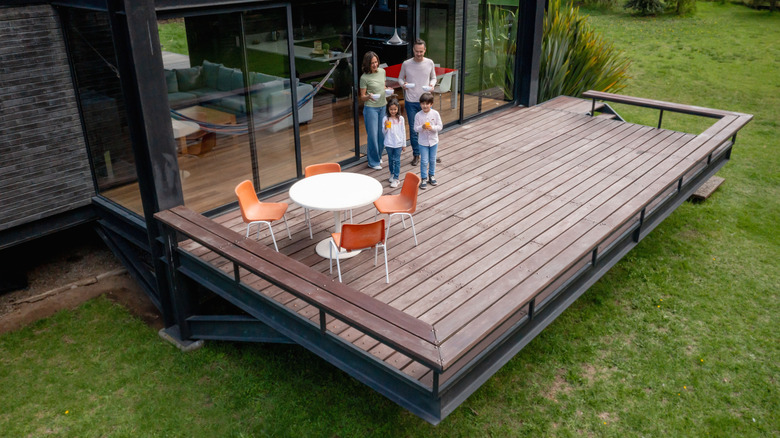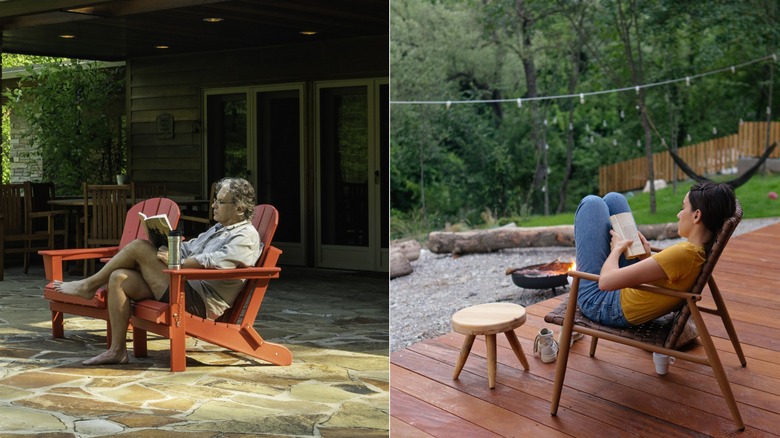Patio Vs. Deck: What's The Difference?
Although society has continued to become more urban over the past two centuries, the desire to spend time outside hasn't faltered. This is evident by the fact the amount of money spent on outdoor living spaces in the United States has continued to grow annually throughout this decade. That growth is predicted to continue, according to a study by Grand View Research. Much of the money being spent on outdoor living is dedicated to building -– or improving –- patios and decks.
The terms patio and deck are often used interchangeably. However, these are actually two different types of structures. So, what is the difference between a patio and deck? There are several. Some of these differences are subtle, while others are more drastic. There are also pros and cons to both patios and decks. Being aware of the differences as well as the advantages and disadvantages of each can help you make the right decision for your outdoor living space. Regardless of which you choose, a patio or deck can add value to your home and enjoyment to your leisure time.
What is a patio?
In the basic sense, a patio is a ground level outdoor seating space. The original intent of a patio was to create an outdoor dining space. So, traditionally patios have been an extension of the house, making it easier to transition between indoor and outdoor spaces. Most older patios were also uncovered. However, recent trends have seen more covered or partially covered patios, particularly those that have an outdoor kitchen incorporated into the design.
Patios are made from a wide range of materials. Wood can be used, but since patios are ground level, more water-resistant materials are typically favored. Concrete, which can be poured into essentially any size and shape, is one of the most common, although it tends to lack the aesthetic appeal of other materials. As a result, it is becoming increasingly common to utilize materials such as natural stone, brick, and pavers to add style and create ambiance. It is also becoming popular to add other design elements, such as a fire pit, to patios.
What is a deck?
Unlike patios, decks are typically raised at least a few feet off the ground. Additionally, decks may have multiple levels. Decks may be attached to the house or they may be built elsewhere in the yard. Building a deck next to a pool or at a place where it can be used as an observation deck for views beyond the yard such as a lake or beach are common. Decks that are attached to homes can be built adjacent to any room or floor of the home.
Traditionally, decks have been made out of wood. Pressure-treated lumber has long been the most common, although other woods such as cedar, redwood, teak, and mahogany are also often utilized. However, it is becoming more common to use something other than these natural woods to create a deck. Composite wood, which is a mix of plastic and recycled wood, is one of the most popular choices. Other possibilities include synthetic materials such as either plastic or PVC decking.
Pros and cons of a patio
There are a number of pros to adding a patio beyond the fact the home value will increase. Among the main advantages of a patio cited is the fact it affords residents more privacy in a residential setting since it is ground level, making it more difficult for nosy neighbors to catch a peek over the fence. Other pros include patios typically being less expensive than decks, are easy to maintain, and have a long life-span with relatively little maintenance. If building from materials such as blocks, bricks, pavers, or natural stone, it may also be possible to install a patio without a permit.
While patios tend to be easier and cheaper to build, that only applies to those with a flat yard, as uneven or rocky terrain may make a deck more practical. Concrete patios are also prone to cracking and staining, while all patios can be slippery and hold water after heavy rain events since they are ground level.
Pros and cons of a deck
Like a patio, a deck will increase a home's value and provide outdoor living space. Regardless of the type of material used, the open slats in the deck allow it to drain well during heavy rain. Since it is elevated, it is also not prone to holding water (this does not mean a wet deck is not slippery, however). Decks also address one of the biggest cons of a patio -– building over rocky or uneven terrain. Elevated decks can easily offset any slope or rugged landscape. Decks can also be built high enough to give a good view of the surrounding area.
However, there are also cons to decks. For starters, they are expensive. Some estimates put the average cost at double that of a patio with similar square footage. Furthermore, natural wood decks have to be maintained. If wooden decks aren't sealed, they can deteriorate rapidly. Individuals with mobility issues may also find elevated decks difficult to navigate.
Patio or deck: Which one is better?
When it comes to choosing between a patio and deck, it really comes down to several factors. You have to weigh whether you prefer the privacy of a patio or the elevated view of a deck. It is also to consider how much maintenance you are willing and capable of doing on a routine basis. Other concerns may be the elevation of your home and any mobility issues for family members or regular guests. Of course, budget is also a concern and you have to decide how much you can and are willing to spend on your new outdoor living space.
All that said, you don't necessarily have to choose between the two. It is becoming much more common to incorporate elements of both patios and decks into backyards. These hybrid outdoor living spaces can also be customized with amenities such as fire pits, grills, outdoor kitchens, bars, and more. The only real limiting factors are your space, budget, and imagination. Depending on the type of structure, style, and materials you choose, as well as your particular skill level, building a patio or deck may be a DIY project or it may be something that requires a professional.
